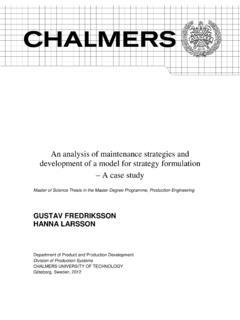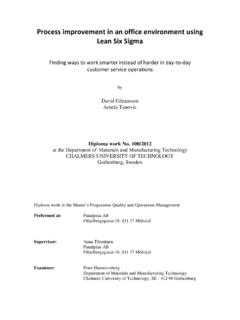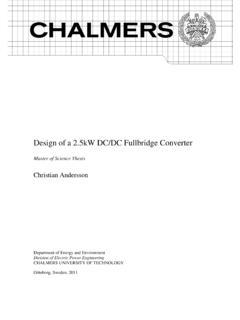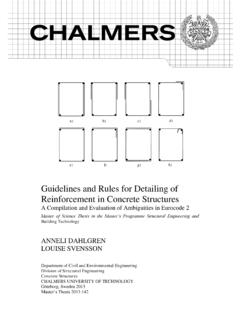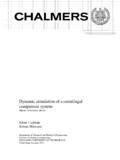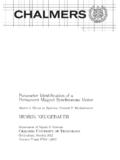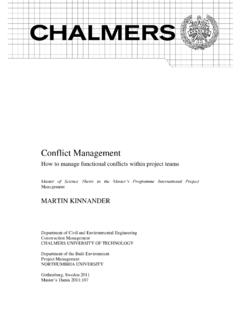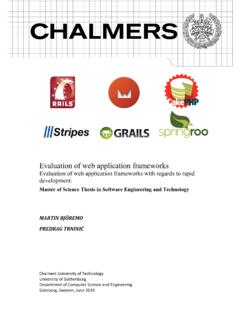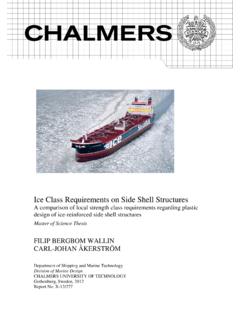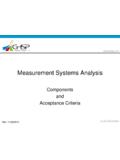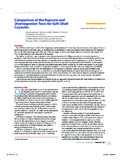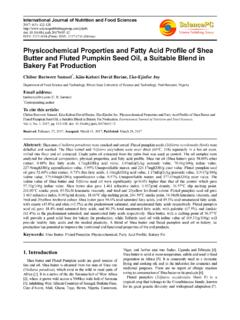Transcription of Process Capability Studies of Heat Treatment
1 Process Capability Studies in Heat Treatment By CHENG LIU Diploma work No. 58/2011 at Department of Materials and Manufacturing Technology CHALMERS UNIVERSITY OF TECHNOLOGY Gothenburg, Sweden Diploma work in the Master programme Advanced Engineering Materials Performed at: Swerea IVF AB 431 22, M LNDAL Supervisor(s): Industrial Supervisor, Hans Kristoffersen Swerea IVF AB, 431 22, M LNDAL University Supervisor, Kenneth Hamberg Chalmers University of Technology, 412 96, G TEBORG Examiner: Senior Lecturer, Six Sigma MBB, Peter Hammersberg Department of Materials and Manufacturing Technology Chalmers University of Technology, SE - 412 96 Gothenburg Process Capability Studies in Heat Treatment CHENG LIU CHENG LIU, 2011.
2 Diploma work no 58/2011 Department of Materials and Manufacturing Technology Chalmers University of Technology SE-412 96 Gothenburg Sweden Telephone + 46 (0)31-772 1000 Cover: [The normal distribution is a bell-shaped curve and is also known as the Gaussian distribution. In Process Capability Studies if a Process has six standard deviations between the Process mean and the nearest specification limit] [Chalmers Reproservice] Gothenburg, Sweden 2011 Process Capability Studies in Heat Treatment CHENG LIU Department of Materials and Manufacturing Technology Chalmers University of Technology SUMMARY Process Capability , which is an important concept within statistical Process control (SPC), describes the ability of a Process a thermal Process to produce components within the tolerance limits.
3 The purpose of this study was to identify possible methods for how to perform Process Capability study and temperature uniformity survey. In this essay the Capability of the case hardening at continuous furnaces have been studied, considering a number of quality parameters. The outcome form these parameters described how well the Process could produce components within the tolerances. The parameters of interest were case depth, core hardness, surface hardness, and surface carbon content. Practical work was done at Volvo Construction Equipment (VCE), Eskilstuna and Getrag All Wheel Drive AB, K ping. The parameters were measured from dummy test specimens in Getrag All Wheel Drive AB, and were analyzed by statistical software Minitab version 16.
4 Temperature uniformity surveys (TUSs) were studied for both companies according to standard AMS 2750 D. However, it was not written in it how to make analysis of temperature data. In TUSs, a datapaq with ten thermocouples where used during production from which the temperature could be logged at different positions of the stacking trays and over the entire cross-section of the furnaces. The furnace temperature was within the specified tolerances; however, the significant differences within each track from each of the furnaces were recorded. One of the furnaces was constructed with two parallel tracks while the other was constructed with three parallel tracks.
5 It s related with the ratio of production capacity for the actual furnace, it will also give information of how the degree of production capacity is influenced by temperature uniformity. The author recommends that both companies perform the same test next year. It is also recommended that further research should be carried out by the methodology that was utilized in this essay. Keywords: Process Capability , heat Treatment , statistical Process control, temperature uniformity survey, analysis of variance, standard deviation I Abstract Process Capability , which is an important concept within statistical Process control (SPC), describes the ability of a heat Treatment Process to produce components within tolerances.
6 In this report, the Capability of gas carburizing in continuous furnaces has been studied considering a series of quality parameters. The outcome from these parameters describes how capable the Process is to produce components within the tolerance limits. The parameters of interest are case hardening depth, core hardness, surface hardness and surface carbon content. These parameters are measured on dummy test samples. In order to achieve better understanding of Process Capability for heat Treatment processes, other parameters such as furnace temperature, furnace atmosphere or carbon potential and the quality of the steel material should also be included.
7 If the furnace temperature is too high or too low, it will have influence on the final results. In this project, temperature uniformity was studied in accordance with standard AMS 2750D. A Data-paq with ten thermocouples was used during the Studies with which the temperatures were logged at different positions on the stacking trays and over the entire length of the furnace. The furnace temperature was within the specified tolerances, however, significant differences within each track in each of the furnaces were recorded. One of the furnaces is designed with two parallel tracks, while the other has three parallel tracks. The temperature uniformity survey will give information about how Process Capability is influenced by the variation of the temperature in the furnace.
8 II III Acknowledgements Many people involved in this project have contributed with their time and knowledge about heat Treatment and statistics. Herein, I want to express my appreciation to them for sharing their experience and technologies in this project. Special thanks should be given to Professor Mr. P. Hammersberg and Mr. H. Kristoffersen who were my examiner and industrial supervisor at Chalmers University of Technology and Swerea IVF for the guidance of my thesis. Professor Peter supplied me with knowledge about statistical analysis methods. Mr. H. Kristoffersen guided me with measurement and methodology development of Process Capability Studies .
9 I would like to thank Ms. E. Troell and Professor K. Hamberg who were my project manager at Swerea IVF and supervisor at Chalmers University of Technology. For practical work at Volvo Construction Equipment (VCE) and Getrag All Wheels Drive AB, I would like to thank Mr. H. Edin and Mr. J. Rydell who were my tutors at VCE for furnace Studies and sample attachment. Mr. T. Kvarnstr m and Mr. K. Wallin at Getrag who were guided me for Capability Studies of measurement and microstructure. I am especially indebted to Mr. Hosseini at Swerea IVF and Mr. J. Aslund at Swerea KIMAB who were colleagues in this project. Their working experiences, generosity and time guided me moving forward, leading to improvement of Process Capability Studies in heat Treatment .
10 Finally, I would like to thank you all the colleagues at Swerea IVF for their kindness and help during last six months. IV V Contents Abstract .. I Acknowledgements .. III 1. Introduction .. 1 Background .. 2 Objectives .. 3 Primary Goal .. 3 Secondary Goal .. 3 Delimitations .. 3 2. Theoretical .. 5 Heat Treatment Processes .. 5 Case Hardening/ Carburizing .. 5 Quenching .. 6 Causes of Variations .. 7 Investigated Heat Treatment Parameters .. 9 Case Hardening Depth (CHD) .. 9 Surface Carbon Content .. 9 Surface Hardness .. 10 Core Hardness .. 10 Process Capability Studies .. 11 Statistical Software Minitab .. 11 Standards (ISO TS 16949: 2002, CQI-9, AMS 2750D).
